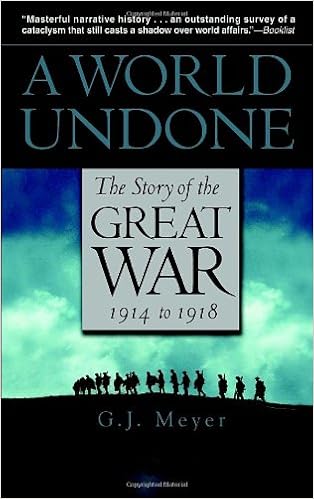My latest book was A World Undone: The Story of the Great War, 1914 to 1918. I'm currently reading Anna Karenina and next up is The Robots of Dawn. After that, I'd really like to read a book that provides a good overview of World War II like A World Undone does for first world war. Very brief research seems to indicate that A World at Arms will be my best bet, but I'm very open to thoughts on that book or other options.
I'll be honest: I could probably count the number of things I knew about WWI prior to reading this book on one hand. World history has never been my strong suit, but I don't feel that this is an event that receives the attention it might deserve in history classes, particularly in the United States. One of the most obvious reasons is that it was so quickly eclipsed. Only two decades later WWII dwarfed WWI in pretty much every respect. It certainly did so with regard to duration, geographic scope, and casualties. More specifically to the US, we entered the war late, so our participation and its impact on us were fairly minimal, at least relative to the major participants. Reading through this book, which I would highly recommend, I found the history fascinating and a number of lessons available to those who would care to learn them.

I'll be honest: I could probably count the number of things I knew about WWI prior to reading this book on one hand. World history has never been my strong suit, but I don't feel that this is an event that receives the attention it might deserve in history classes, particularly in the United States. One of the most obvious reasons is that it was so quickly eclipsed. Only two decades later WWII dwarfed WWI in pretty much every respect. It certainly did so with regard to duration, geographic scope, and casualties. More specifically to the US, we entered the war late, so our participation and its impact on us were fairly minimal, at least relative to the major participants. Reading through this book, which I would highly recommend, I found the history fascinating and a number of lessons available to those who would care to learn them.

One of the facts that I did know, and I think most people know, is that a key incident leading to the war was the assassination of the Archduke Franz Ferdinand and his wife Sophie. Many would probably say that the assassination caused the war, but that's probably an over simplification. According to Meyer's account, his death seemed closer to an excuse than a cause. That isn't to say countries were, as a policy, looking for a chance to go to war. While there were some individuals who felt that a war needed to happen or their country's power would degrade to the point where it would be unable to defend itself. By and large, however, the war came about due to a tragic confluence of misunderstandings, bad decisions, and poor planning.
On one hand, it seems as though any number of small changes could have prevented the war. On the other hand, given the political landscape and the individuals in power, it seems like it was inevitable that a crisis of some kind would develop. In many of the states involved in the conflict, it seems that there was little to no correlation between competence and position. One good example is Conrad von Hötzendorf, a war monger instrumental in starting the war who, as commander of their forces. proceeded to render the Austro-Hungarian army incapable of effective action through a continuous series of ill-advised fronts that ultimately accomplished nothing. There were no consequences: "Conrad was relieved of command and elevated from baron to count, presumably for some reason other than his contributions to the destruction of the Hapsburg empire."
Conrad wasn't alone in incompetence but, to some extent, this was understandable. World War I came at a point where technological development was radically altering the nature of armed conflict in a way that the commanders were completely blindsided by. The generals were still relying on cavalry, a unit that had been rendered completely ineffective by machine guns. What wasn't excusable was the almost complete lack of adaptation to these new realities. For all four years of the war, the majority of the generals continued to send tens of thousands of men to their deaths in offensives that had no meaningful chance of success. Even worse were offensives engaged in for their own sake, having no objective and seemingly arising solely out of blind desperation.
As for the book, I thought it was great. It told the story in an interesting and engaging way. It provided a both a broad view of the war and in-depth looks at the most important figures involved. The author also endeavored to provide context for the decisions that were being made. It's helpful to know whether a terrible decision was understandable given the circumstances and available information or was just really unsupportable. I'd highly recommend it to anyone interested in WWI or looking for historical non-fiction books generally.
No comments:
New comments are not allowed.